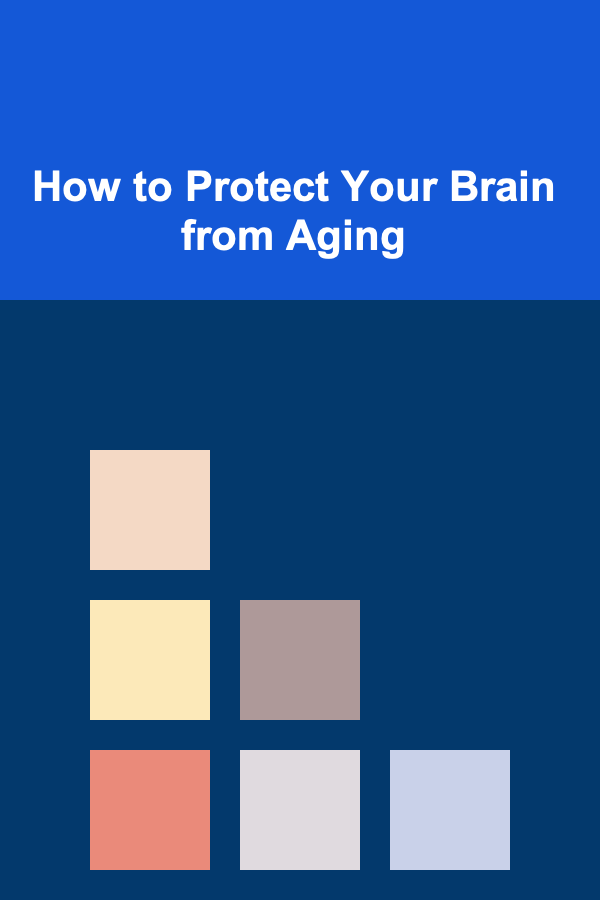
How to Protect Your Brain from Aging
ebook include PDF & Audio bundle (Micro Guide)
$12.99$5.99
Limited Time Offer! Order within the next:

Aging is a natural process, but the decline of brain function that often accompanies it can be distressing. As we age, it is common to experience changes in memory, cognitive abilities, and overall brain health. However, the aging of the brain does not have to be inevitable or rapid. With the right habits and strategies, it is possible to protect the brain and even slow the effects of aging. In this article, we will explore ways to protect your brain from aging by adopting a holistic approach to physical, mental, and emotional well-being.
Understanding the Brain Aging Process
Before diving into preventative measures, it's important to understand the biological processes behind brain aging. The brain, like any other part of the body, undergoes changes over time. These changes are influenced by both genetic factors and lifestyle choices.
1. The Role of Neuroplasticity
Neuroplasticity refers to the brain's ability to reorganize and form new neural connections. As we age, neuroplasticity typically decreases, but it doesn't disappear entirely. This means that even in later years, the brain can still form new connections and adapt to new experiences. However, neuroplasticity is most effective when the brain is actively stimulated through learning and engaging in novel experiences.
2. Decline in Cognitive Function
As we age, the brain's structure and function gradually decline. This can manifest in slower processing speed, decreased memory retention, and more difficulty learning new information. Certain areas of the brain, such as the hippocampus (which is crucial for memory), may shrink with age. Moreover, the loss of dopamine, a neurotransmitter involved in mood regulation and cognitive processes, can lead to mood swings, difficulty focusing, and even the development of neurodegenerative diseases like Parkinson's and Alzheimer's.
3. Accumulation of Toxins
One of the more harmful effects of aging is the accumulation of toxins and metabolic waste products in the brain. As we grow older, the body's natural detoxification systems, including the lymphatic system, become less efficient, and harmful substances can build up. This can lead to inflammation in the brain, which is associated with cognitive decline and diseases like Alzheimer's.
4. Reduced Blood Flow to the Brain
The brain's blood supply diminishes with age, which means fewer nutrients and oxygen are delivered to brain cells. This reduced blood flow can affect brain function, making it harder to concentrate and process information effectively. Additionally, reduced blood flow can lead to the development of vascular dementia, a condition caused by damage to blood vessels in the brain.
Strategies to Protect Your Brain
While these age-related changes are inevitable, there are several lifestyle changes and strategies that can help protect the brain and slow down the aging process. Below are practical tips for maintaining brain health well into old age.
1. Exercise Regularly
One of the most effective ways to protect the brain is through regular physical activity. Exercise benefits the brain in numerous ways:
- Increased Blood Flow: Physical activity increases circulation and promotes the flow of oxygen and nutrients to the brain.
- Neurogenesis: Studies have shown that exercise can stimulate the production of new neurons in the hippocampus, particularly through aerobic exercise like running or swimming.
- Reduced Inflammation: Exercise helps reduce inflammation in the brain, a major contributor to cognitive decline.
- Improved Sleep: Regular exercise promotes better sleep, which is essential for memory consolidation and overall cognitive health.
Aim for at least 150 minutes of moderate aerobic activity or 75 minutes of vigorous aerobic activity per week. Additionally, incorporating strength training exercises twice a week can further support brain health by improving mood and mental clarity.
2. Eat a Brain-Healthy Diet
What we eat plays a crucial role in the health of our brain. A balanced, nutrient-rich diet can provide the brain with the fuel it needs to function optimally and protect it from aging-related damage. Some dietary components are particularly beneficial for brain health:
- Omega-3 Fatty Acids: Found in fatty fish like salmon, mackerel, and sardines, omega-3s are essential for maintaining the structure of brain cells and supporting communication between them. Omega-3s have been shown to reduce the risk of Alzheimer's and improve cognitive function.
- Antioxidants: Berries, nuts, and leafy greens are packed with antioxidants, which help neutralize harmful free radicals that can damage brain cells. Blueberries, in particular, contain anthocyanins, compounds that have been linked to improved memory and cognitive function.
- Whole Grains: Whole grains provide a steady supply of glucose, the brain's primary source of energy. Foods like oats, brown rice, and quinoa help maintain stable blood sugar levels and support brain function.
- Vitamin E: Found in nuts, seeds, and leafy greens, vitamin E has antioxidant properties that help protect brain cells from oxidative stress.
- Leafy Greens: Vegetables like spinach, kale, and broccoli are rich in folate, which is critical for cognitive function and preventing cognitive decline.
Additionally, reducing the consumption of processed foods, added sugars, and trans fats is essential for maintaining long-term brain health.
3. Challenge Your Brain
Just as physical exercise is important for maintaining bodily health, mental exercise is essential for protecting the brain. Engaging in activities that stimulate your mind can help promote neuroplasticity, strengthen neural connections, and delay cognitive decline. Here are some ways to challenge your brain:
- Learn Something New: Whether it's a new language, musical instrument, or hobby, learning new skills challenges the brain to adapt and form new neural pathways.
- Play Brain Games: Sudoku, crossword puzzles, chess, and other brain-training games help improve memory, attention, and problem-solving skills.
- Read Regularly: Reading enhances vocabulary, cognitive function, and comprehension, keeping the brain active and engaged.
- Socialize: Maintaining social connections and engaging in meaningful conversations helps stimulate cognitive function. Socializing also provides emotional support, which is crucial for mental well-being.
The key is to keep the brain engaged by trying new and stimulating activities regularly.
4. Get Quality Sleep
Sleep is one of the most important factors for maintaining brain health. During deep sleep, the brain consolidates memories, removes waste products, and regenerates. A lack of sleep or poor-quality sleep can have detrimental effects on cognitive function and increase the risk of cognitive decline.
- Aim for 7--9 hours of sleep per night: Consistently getting enough sleep helps improve memory, problem-solving abilities, and overall cognitive function.
- Practice Good Sleep Hygiene: Establish a regular sleep schedule, create a relaxing bedtime routine, and minimize exposure to screens before bed to ensure deep, restorative sleep.
- Address Sleep Disorders: Conditions like sleep apnea can disrupt sleep quality, leading to cognitive impairment. If you suspect you have a sleep disorder, speak with a healthcare provider to address it.
5. Manage Stress Effectively
Chronic stress can have a negative impact on the brain, leading to the shrinkage of the hippocampus and impairing memory and learning. Stress can also increase the production of cortisol, a hormone that, when elevated over long periods, can damage brain cells. Managing stress is critical for preserving brain function as you age.
Here are some strategies for managing stress:
- Mindfulness Meditation: Meditation practices like mindfulness help reduce stress by promoting relaxation and increasing focus and clarity. Studies have shown that mindfulness meditation can increase gray matter in areas of the brain responsible for learning and memory.
- Deep Breathing: Deep breathing exercises activate the parasympathetic nervous system, which helps calm the body and reduce stress.
- Physical Exercise: Exercise not only improves physical health but also helps reduce the effects of stress by releasing endorphins, which are natural mood boosters.
- Relaxation Techniques: Techniques like progressive muscle relaxation, yoga, or tai chi can help manage physical tension and promote mental calmness.
By incorporating stress-management practices into daily life, you can protect your brain from the harmful effects of chronic stress.
6. Avoid Smoking and Excessive Alcohol Consumption
Smoking and excessive alcohol consumption can accelerate the aging process of the brain. Smoking has been shown to increase the risk of cognitive decline and Alzheimer's disease by damaging blood vessels in the brain. Similarly, excessive alcohol consumption can cause brain damage, impair memory, and increase the risk of dementia.
- Quit Smoking: If you smoke, quitting is one of the most effective ways to protect your brain health. Seek support from healthcare professionals, as there are various methods available to help with smoking cessation.
- Limit Alcohol: Excessive alcohol intake can be toxic to brain cells. For optimal brain health, limit alcohol consumption to moderate levels --- no more than one drink per day for women and two drinks per day for men.
7. Monitor Your Mental Health
Mental health plays a significant role in brain health. Depression, anxiety, and other mental health conditions can negatively affect cognitive function and increase the risk of neurodegenerative diseases. It is essential to address any mental health issues as early as possible to protect the brain.
- Seek Help When Needed: If you experience symptoms of depression, anxiety, or other mental health conditions, seek professional help. Therapy, medication, and lifestyle changes can significantly improve mental health and protect brain function.
- Maintain a Positive Outlook: A positive attitude and sense of purpose have been shown to support brain health. Engage in activities that bring joy and fulfillment to your life.
8. Stay Hydrated
Hydration is often overlooked but is crucial for brain health. The brain is made up of about 75% water, and dehydration can impair cognitive function, causing difficulties with concentration, memory, and mood. Make sure to drink plenty of water throughout the day, especially during physical activities or hot weather.
Conclusion
Protecting your brain from aging involves a multifaceted approach that includes maintaining a healthy lifestyle, challenging the mind, managing stress, and fostering emotional well-being. By incorporating these strategies into your daily routine, you can promote neuroplasticity, reduce the risk of cognitive decline, and ensure that your brain remains healthy and sharp for years to come. While aging is inevitable, with the right habits and mindset, you can enjoy a lifetime of mental clarity, creativity, and vitality.

How to Build a Bond with Your New Pet and Create Trust
Read More
How to Create a Pantry Inventory App for Your Smartphone
Read More
How to Install Soundproofing Foam Panels for Maximum Effectiveness
Read More
How to Start Saving Money on Household Bills: Easy and Effective Strategies
Read More
How to Use Checklists for Streamlined Office Tasks
Read More
How to Manage Tantrums and Big Emotions Effectively
Read MoreOther Products

How to Build a Bond with Your New Pet and Create Trust
Read More
How to Create a Pantry Inventory App for Your Smartphone
Read More
How to Install Soundproofing Foam Panels for Maximum Effectiveness
Read More
How to Start Saving Money on Household Bills: Easy and Effective Strategies
Read More
How to Use Checklists for Streamlined Office Tasks
Read More